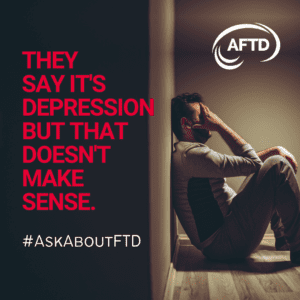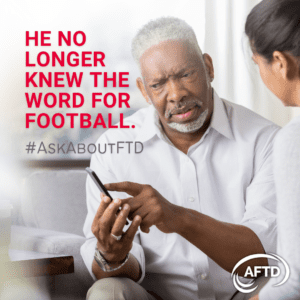Do the FTD symptoms sound familiar?
It takes an average of 3.6 years to get an FTD diagnosis and we want to change that.

 FTD is a group of neurodegenerative diseases. Unlike Alzheimer's, which primarily affects memory, FTD changes a person’s behavior, personality, language, and/or movement – often striking when people are at the height of their careers, or raising young families. It is often misdiagnosed or not diagnosed at all. AFTD wants to change that. Today, diagnosing FTD can bring hope, connecting families with a growing number of experimental treatments currently in trials.
FTD is a group of neurodegenerative diseases. Unlike Alzheimer's, which primarily affects memory, FTD changes a person’s behavior, personality, language, and/or movement – often striking when people are at the height of their careers, or raising young families. It is often misdiagnosed or not diagnosed at all. AFTD wants to change that. Today, diagnosing FTD can bring hope, connecting families with a growing number of experimental treatments currently in trials.
FTD symptoms are not always listed on patient screeners, so AFTD developed diagnostic checklists that you can download to help identify red flags for the two most common types of FTD – behavioral variant FTD (bvFTD) and primary progressive aphasia (PPA). The back of the document is designed to help physicians better understand FTD diagnostic criteria. AFTD encourages you to print these free FTD symptom checklists and bring them to your next doctor's appointment.
Sign up to Receive AFTD Resources
Need more information? Make sure you don't miss these other informative pages on our website:
You can also reach out to the AFTD HelpLine for more assistance, by calling 1-866-507-7222 or info@theaftd.org.



